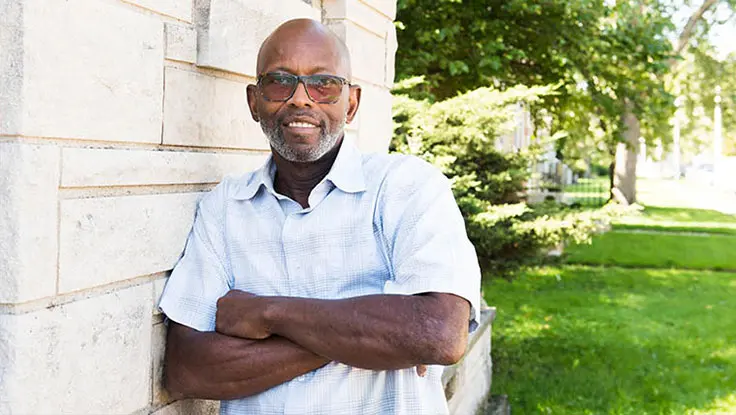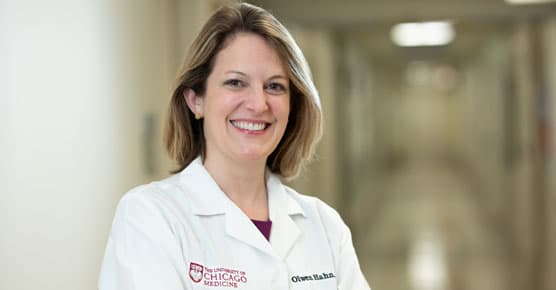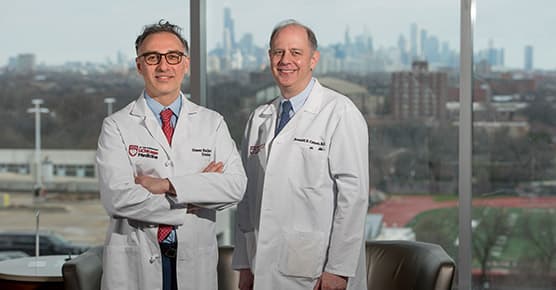Male Breast Cancer
Men have breast tissue, too, which means men can develop breast cancer just like women can.
The risk is small. Men have much less breast tissue under the nipple area of their chests than women do. Men also produce significantly less of the hormone estrogen, which stimulates the growth of some breast cancers.
Only about 1 in 800 men develop breast cancer in their lifetimes, according to the American Cancer Society. In comparison, 1 in 8 women will be diagnosed with breast cancer during their lives.
However, every man should be aware of the possibility of developing breast cancer. This is especially important for men who are at greater risk due to a family history of breast cancer or other risk factors.
UChicago Medicine breast cancer experts recommend that men pay attention to any changes in their breasts. If they feel a lump under a chest nipple or skin changes around their breast, then they should see their doctor. Men often present with more advanced breast cancer than women do. This may be because they delay seeking evaluation for breast changes.
Our breast cancer experts also encourage men to educate themselves about breast cancer. To get started, see the frequently asked questions below.
Frequently Asked Questions About Breast Cancer in Men
A mass or lump under the skin of the breast is a common sign of possible breast cancer. Most of male breast cancers are located underneath a nipple of one breast, although a lump could be elsewhere in the breast area.
Other symptoms include:
- A breast nipple that turns or points inward
- Skin changes in the breast area, such as swelling or redness
- Ulcers of the skin in the breast area.
Swollen lymph nodes underneath one arm may also indicate cancer, but lymph nodes can swell for a variety of reasons.
Most breast cancers that develop in men, as well as women, are driven by the hormone estrogen. Men tend to have much less estrogen than women, but certain conditions can raise estrogen levels in men:
- Obesity: Fat cells in the body contain an enzyme called aromatase, which can convert other hormones in the body into a form of estrogen called estradiol. Thus, obesity can raise the amount of estrogen in a man’s body.
- Severe liver disease: When the liver does not work well, female estrogen levels tend to increase and male hormones tend to decrease.
- Klinefelter syndrome: Men with this rare genetic condition are born with an extra X chromosome, which causes their bodies to produce higher amounts of estrogen and lower amounts of androgens, which are male sex hormones.
- Taking exogenous estrogen: Transgender women who take feminizing hormone therapy have a higher risk of developing breast cancer than cisgender men, but not as high as the general female population.
A number of other risk factors influence a man’s risk of developing breast cancer:
- Getting older: Most male breast cancers occur after age 50, according to the Centers for Disease Control and Prevention.
- A family history of breast cancer: If a family member (female or man) had breast cancer, a man’s risk rises.
- Inherited mutations linked to breast cancer, including BRCA1 and BRCA2, also increase a man’s risk.
- Gynecomastia: Men with this condition have a greater amount of breast tissue than normal. Because these men have more breast tissue, they have more breast cells that could potentially mutate and become cancerous.
- Race/ethnicity: One study found that Black men had a 52% higher incidence of breast cancer than white men.
- Radiation treatment: Men who have had radiation treatment to the chest have a higher risk of breast cancer.
If a family member is found to carry genetic mutations, such as BRCA1 or BRCA2, then men should definitely seek genetic testing and counseling. Genetic mutations, such as BRCA 1 and BRCA 2, can raise a man’s risk for prostate and pancreatic cancers as well as breast cancers.
UChicago Medicine’s Comprehensive Cancer Risk & Prevention Clinic can help men determine their risk for all types of cancer. Genetic counselors at the clinic also provide patients with a personalized plan for when to get screenings and exams, as well as how to lower their risk for cancers.
However, if you have a high risk for breast cancer because of family history or a medical condition, you may benefit from self-exams and yearly clinical breast exams. Talk to your doctor for guidance.
Mammograms and other diagnostic tests are generally only performed on men who are suspected of having breast cancer.
At UChicago Medicine, we recommend that all men who are diagnosed with breast cancer obtain genetic tests to learn if they carry genetic mutations.
- If the patient tests positive for an inherited mutation, then his family members should also seek genetic testing to determine if they carry the mutation.
- If the patient has a negative genetic test, then his family members may still have a slight increased hereditary risk for breast cancer. Genetic tests cannot yet identify all the genetic mutations that raise disease risk.
Oncologists divide breast cancers into three groups based on the following questions:
- Are hormone receptors — estrogen and progesterone — present? If so, the cancer is known as a hormone-driven cancer.
- Is a protein called HER2 present in the cancer cells? If so, the cancer is known as a HER2 positive cancer. The protein HER2 encourages the growth of cancer cells.
- Are the answers to the two previous questions “no?” Then the cancer is called triple-negative breast cancer.
Based on what is currently known, men seem to develop the same types of breast cancer as women do. The majority of breast cancers in both men and women are hormone driven. About 15% to 20% are HER2, and about 10% to 15% are triple-negative cancers.
However, the amount of research on male breast cancer is small. As more research is conducted, scientists may identify subtle differences between the types of breast cancer that men and women tend to develop.
Knowing the type of breast cancer a patient has is critical to determining the best treatment options. For instance, drug treatments for HER2 cancers are different than for hormone-driven cancers.
Ultimately, a biopsy must be performed to rule out or confirm that a patient has breast cancer. A biopsy involves removing a sample of breast cells from the area of the breast where cancer is suspected. This can often be done with a needle. A pathologist can then examine and run tests on the cells to make a formal diagnosis.
Male Breast Cancer Treatment
At UChicago Medicine, breast cancer patients benefit from a team of specialists — including a medical oncologist, surgical oncologist, and radiation oncologist — who work together to develop a personalized treatment plan for each patient based on the type of breast cancer he has, the stage of his cancer, and any treatment preferences or concerns he has. Our team extends to include experts in endocrinology and men’s health who may assist with endocrine management and solutions to reduce side effects associated with treatment.
Treatment for men with breast cancer is similar to treatment for women with the disease and may involve some combination of surgery, radiation, and/or drug therapy:
During the mastectomy, the lymph nodes under the arm near the cancerous breast may also be removed if they are found or suspected to contain cancer.
Plastic surgeons at UChicago Medicine can talk with male patients about their options for reconstructive surgery, which may include nipple implants and reconstruction.
If a man has hormone-driven breast cancer, then he is typically prescribed antiestrogen therapy, typically the drug tamoxifen, for five or more years. The drug, which blocks estrogen in the body, helps prevent breast cancer recurrence.
In recent years, new and exciting drug treatments for breast cancers, including late-stage cancers, have come available. Men with HER2 cancers now benefit from drugs that specifically target HER2 positive cancers. Other targeted drugs, known as PARP inhibitors, are being used to treat cancers with BRCA1 and BRCA2 mutations. In addition, immunotherapy can be used to stimulate the immune system to fight triple-negative breast cancers. Plus, new antibody drugs act like smart bombs, delivering chemotherapy directly to cells that carry certain proteins or other substances.
Research and Supportive Care for Male Breast Cancer
Our physician researchers are investigating a number of novel treatments for breast cancer and plan to enroll both men and women with the disease in the studies.
Our patients and their families have access to our dedicated supportive oncology program, which provides a range of services, including mental health counseling, social work services and more.
In addition, patients have access to a wide range of other supportive staff and services, including:
- Nurse practitioners who will help men navigate their cancer treatment
- Nutritionists to help maintain a healthy diet
- Pain control experts
- Physical and occupational therapists who can help patients with physical side effects of cancer treatment
- Physician specialists who can help address medical concerns related to treatment, such as cardio-oncologists who can consult on heart problems caused by treatment.
Why should a man with breast cancer come to UChicago Medicine for care?
The National Cancer Institute recognizes UChicago Medicine as a Comprehensive Cancer Center, a prestigious designation bestowed upon the nation’s top cancer centers in recognition of their innovative research and leading-edge treatments.
The breast cancer team at UChicago Medicine is highly experienced at diagnosing and treating breast cancer in men as well as women. We are a major academic health system serving patients with both rare and common diseases from across the country and around the world. As a result, our team has treated a lot of men, as well as women, with breast cancer, and are familiar with the unique concerns that men have about the disease. UChicago Medicine also offers full health services for men so they can obtain other care, as needed.
In addition, because many of our physicians are also scientists and researchers, they are on top of the latest treatment advances, which helps ensure our patients benefit from innovations in breast cancer care as soon as they are available.
We take a multidisciplinary approach to care, which means that all our specialists — pathologists, medical oncologists, surgical oncologists, radiation oncologists, and others — gather together to discuss each patient’s case and explore the best treatment approaches.
We also place a high priority on understanding each patient’s perspective and concerns. This helps us to develop personalized treatment plans that reflect each patient’s preferences and goals.
This patient-centered team approach to care is critical to us attaining better outcomes for our patients.
Male breast cancer patient tackles the rare disease

Request an Appointment
We are currently experiencing a high volume of inquiries, leading to delayed response times. For faster assistance, please call 1-855-702-8222 to schedule your appointment.
If you have symptoms of an urgent nature, please call your doctor or go to the emergency room immediately.
For Referring Physicians
To refer a patient for breast cancer care, please call UCM Physician Connect at 1-800-824-2282.
* Indicates required field

Cancer Care Second Opinions
Request a second opinion from UChicago Medicine cancer care experts.

Clinical Trials for Breast Cancer
We're actively conducting phase I, II and III clinical trials for breast cancer.

